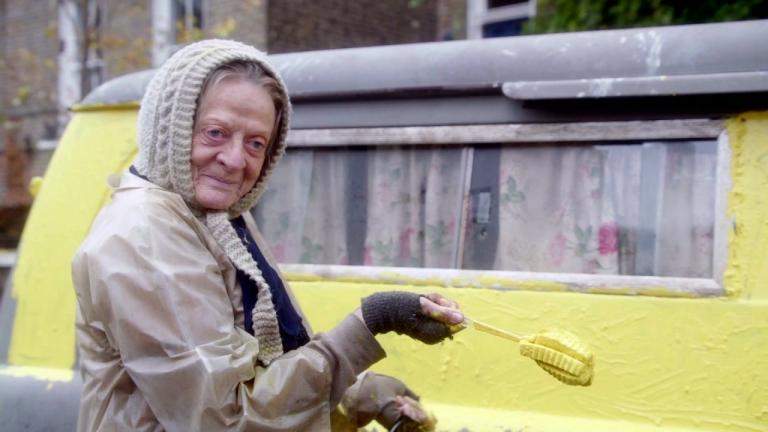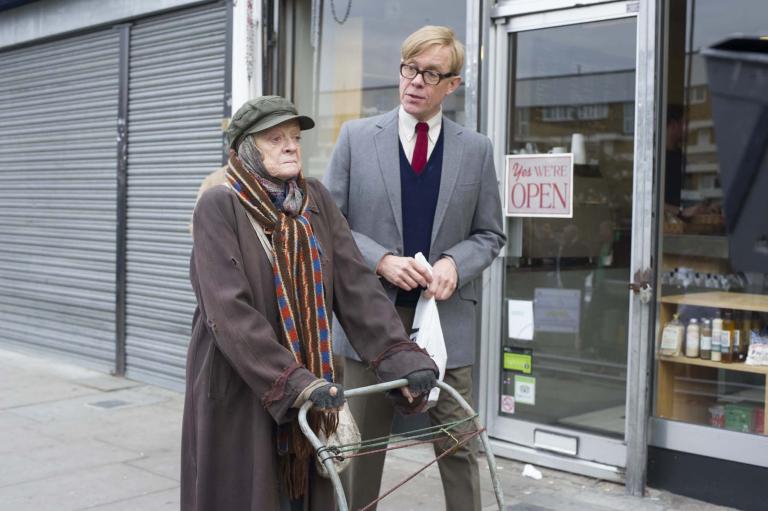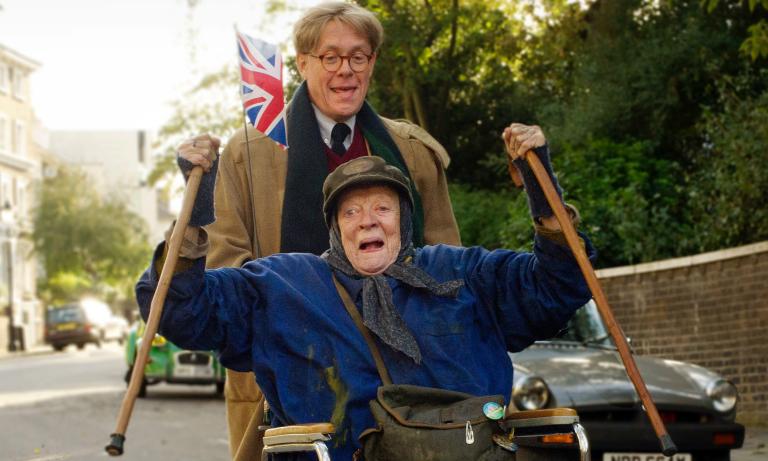
In an episode NBC’s Friends—“The One Where Phoebe Hates PBS”—sage theosophist Joey Tribbiani argues that there is no such thing as a selfless act of charity. Good deeds inherently make the good-deeder feel good, “so that makes it selfish.”
I thought about that episode while watching the quirky, delightful English comedy The Lady in the Van (coming out on DVD and Blu-Ray April 19). If there was ever a good deed to feel bad about, it might be helping the titular lady.
Miss Shepherd (Maggie Smith) is as frustrating a charity case if ever there was one. She lives (as you might’ve guessed) out of a van—one painted a chipper shade of canary. Alas, the van’s optimistic hue can’t hide the stench coming from either the inside of the van or from Miss Shepherd herself: She likely hasn’t bathed since the Thatcher administration (though she insists that she once won awards for her cleanliness) and shows little inclination of taking one now. Her toilet, such as it is, consists of a series of plastic bags (“strong ones, I hope,” quips her “neighbor,” Alan Bennett), but she’s not always studious about either their use or her aim.
The residents of Camden—the prim, proper, progressive London neighborhood in which she’s parked herself—wish she would push her van elsewhere … but they’re too charitable and, frankly, too British to suggest it. Instead, they treat her as a curbside charity: They bring her food, they ask about her welfare, they buy her gifts for Christmas. And how does she accept all this neighborly goodness? With, at best, a sense of entitlement and, at worst, a scowl and a scolding. She’ll sniff at homemade casseroles as if they’d been made of raccoon hair. She’ll shoo away concerned passers-by. And if you dare serenade her with music … well, Miss Shepherd flies into the sort of rage you’d expect from someone who suspects you just killed her favorite cat.
Mr. Bennett (Alex Jennings) describes her as a “bigoted, blinkered, cantankerous, devious, unforgiving, self-serving, rank, rude, car-mad cow, which is to say nothing of her flying feces and her ability to extrude from her withered buttocks turds of such force, that they land a yard from the back of the van and their presumed point of exit.”
And yet when it appeared as if city laws would force Miss Shepherd to move from Camden, Mr. Bennett opened his driveway to her (if not his house), allowing her to stay. And there she stayed for 15 years.

And it made me wonder … would I have allowed someone like Miss Shepherd to hang out in my neighborhood for 15 years? Would I have lasted 15 days before I started calling the cops or the neighborhood watch?
It’d be different if she showed some signs of changing: Looking for a job, perhaps, or seeking a shower once a week. Or even if she showed a little gratitude. Maybe it’d be OK if she made me feel good about my goodwill. Miss Shepherd refuses to pay even that little bit of recompense. Charity only goes so far, after all.
Or does it?
While the Bible tells us over and over to give, give and give some more, very few seem to suggest we should stop giving if we’re not adequately rewarded. Oh, sure, the book of Hebrews says our “sacrifices are pleasing to God,” and Proverbs suggests that He’ll repay us someday, but rarely does it promise satisfaction in this life. It simply says to give. To help. To be God’s hands and feet wherever they’re needed. “Do not neglect to show hospitality to strangers,” Hebrews 13:2 says, “For thereby some have entertained angels unawares.”
It’s an interesting verse to connect with The Lady in the Van (based on the real-life experiences of the real playwright Alan Bennett). While Miss Shepherd is no angel, she is deeply religious. Her van is filled with icons. She prays relentlessly—sometimes with so much fervor and violence as to make Mr. Bennett wonder why. She even claims to commune with the saints at times. When someone tells her she can’t park where she’s parked, she waves him off, saying she’s had guidance.
“The Virgin Mary,” she says. “I spoke to her yesterday. She was outside the post office.”
And even though Miss Shepherd can often be as far from divine as one can get, there are times when she looks a bit … angelic. (If you see the movie, you’ll know what I mean). And even when she’s at her at her most infernal, she still brings out the better angels of her neighbors’ natures—especially in Mr. Bennett.
When someone suggests to Mr. Bennett that he’s become Miss Shepherd’s caregiver of sorts, he’s horrified. “I do not care,” he insists, “and I do not care for! I am here, and she is there.” But it’s a lie, and the lie becomes bigger with time. Even though Miss Shepherd never becomes the least bit nicer as the years wear on, she and Mr. Bennett grow to appreciate each other. Respect each other. Care for each other.
Even though Miss Shepherd made every act of charity a terrible chore, the charity was still strangely rewarded.
Perhaps Joey was right: Perhaps no matter how hard we try, maybe it’s impossible to do something good and feel unequivocally awful about it. Perhaps God has wired us in such a way that, when we do His will, we feel His joy.













